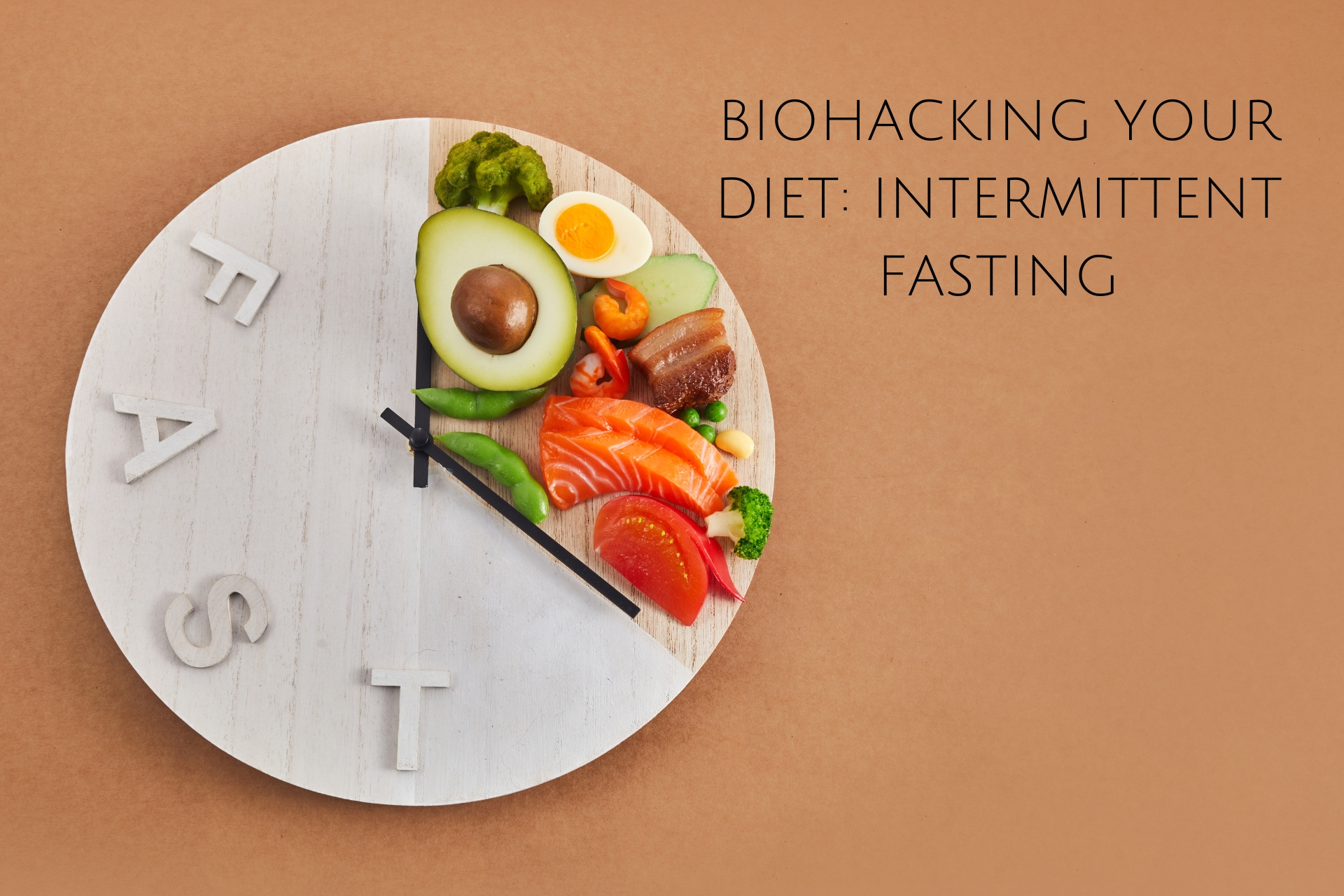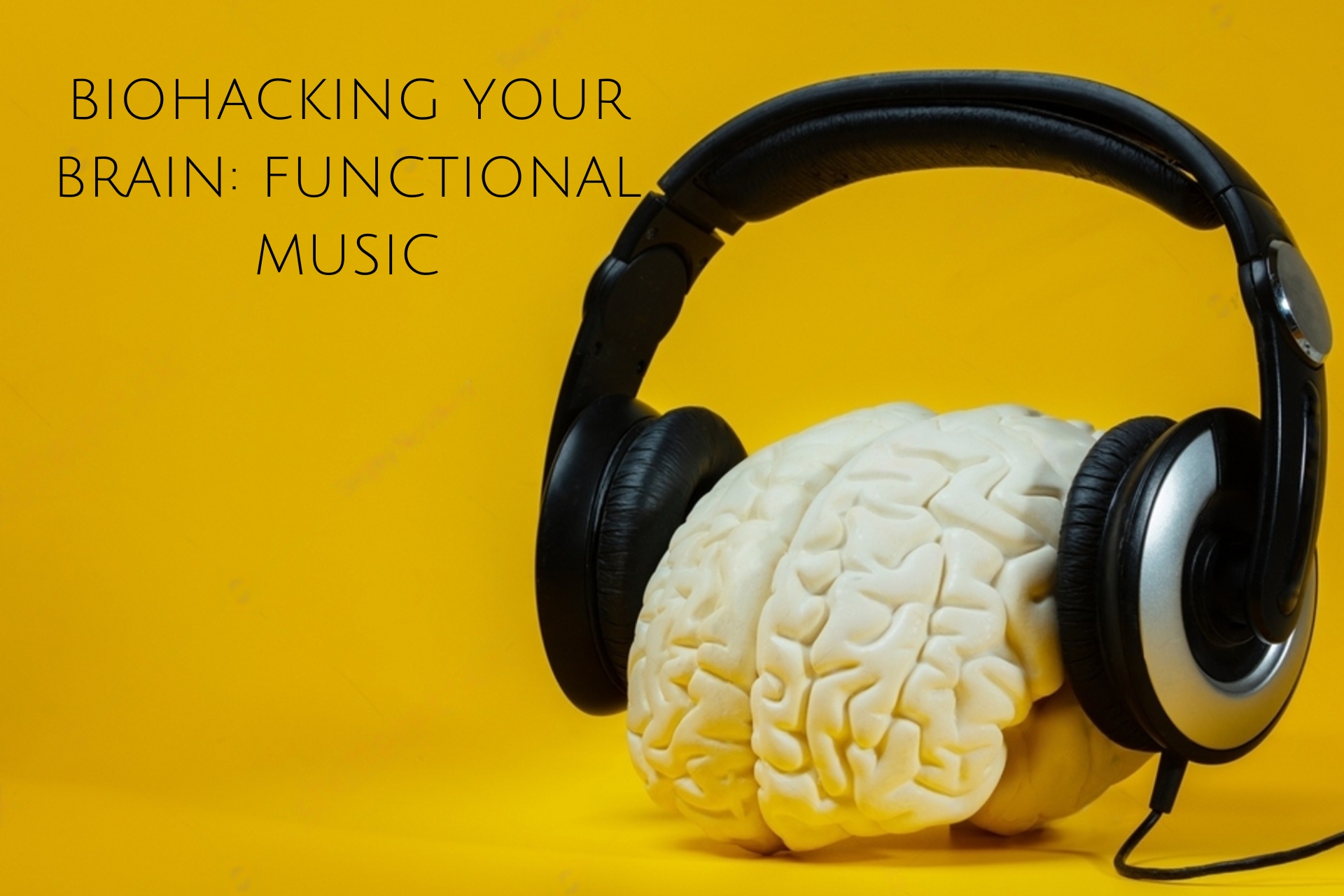Biohacking Your Life: Diet, Brain, Mindset, and Function
BIOHACKING YOUR DIET: INTERMITTENT FASTING

Intermittent fasting (IF) is an eating biohacking method that includes intervals between eating time period and the fasting. This diet pattern has became popular for its capacityof its health benefits beyond weight loss. Here’s an detail explanation of Intermittent fasting and its advantages:
How Intermittent Fasting Works:
During fasting periods, humans resist from taking calories intake for a limited period, basically from 16 to 24 hours or longer. Intermittent Fasting can be done by individuals by consuming all their daily calories within a particular time, often between 4 to 8 hours. There are many ways of Intermittent Fasting, including the 16/8 system, the 5:2 method, and every other day fasting.
Potential Benefits of Intermittent Fasting:
- Weight Loss and Body Composition: Intermittent fasting helps in weight loss and improve body health by decreasing the daily calorie consumption and helps in achieving fat loss while maintaining muscle mass.
- Improved Metabolic Health: IF has been shown to improve insulin sensitivity, reduce blood sugar levels, and lower the risk of type 2 diabetes.
- Enhanced Autophagy: Fasting triggers autophagy, a cellular process that removes damaged or dysfunctional components, promoting cellular repair and renewal.
- Brain Health: Some studies suggest that intermittent fasting may have neuroprotective effects, improving cognitive function and reducing the risk of neurodegenerative diseases like Alzheimer's.
- Heart Health: Intermittent fasting can improve cardiovascular health by reducing inflammation, lowering blood pressure, and improving lipid profiles.
Safety Considerations:
- Intermittent fasting results may differ depending on the person.
- Nutrient Intake:Focus on nutrient-dense foods during your eating periods to meet your body's needs and avoid deficiencies.
- Hydration: Staying hydrated is crucial during fasting periods.Drink plenty of water, herbal tea, or other non-caloric beverages to stay hydrated.
- Medical Conditions: Individuals with certain medical conditions, such as diabetes, eating disorders, or hormonal imbalances, should consult a healthcare professional before attempting intermittent fasting.
- Gradual Adaptation: If you're new to intermittent fasting, start gradually by gradually increasing fasting periods and monitoring how your body responds.
BIOHACKING YOUR BRAIN: FUNCTIONAL MUSIC

Functional music is a biohacking process that helps in improving brain activity and mental wellness with the help of particularly created music tracks. These tracks usually include elements like particular waves, beats, and patterns that help to determine cognitive activity and include specified mind states, and functional music is also known as cognitive entertainment or cognitive improvement music. Here’s an detailed explanation of how functional music works and its benefits :
How Functional Music Works:
- Brainwave Entrainment: Functional music utilizes the principle of brainwave entrainment, where external stimuli, such as auditory beats or rhythms, synchronize with the brain's natural electrical activity.
- Frequency Following Response (FFR): When exposed to rhythmic auditory stimuli, the brain tends to synchronize its neural oscillations with the frequency of the stimulus, leading to changes in brainwave patterns.
- Binaural Beats: Functional music often incorporates binaural beats, which are created by playing two slightly different frequencies in each ear. The brain perceives a third frequency, corresponding to the difference between the two, which can influence brainwave activity.
- Isochronic Tones: Similar to binaural beats, isochronic tones involve playing single tones at regular intervals, which can also influence brainwave patterns and induce desired mental states.
Potential Benefits of Functional Music:
- Stress Reduction: Certain types of functional music, such as tracks with alpha or theta frequencies, may promote relaxation and reduce stress levels by inducing a state of calmness and tranquility.
- Improved Focus and Concentration: Functional music designed to enhance focus and cognitive performance may incorporate beta frequencies, which are associated with alertness and mental clarity.
- Enhanced Sleep Quality: Functional music with delta frequencies, often used in sleep tracks, may help improve sleep quality and promote deeper, more restorative sleep.
- Mood Enhancement: Functional music can influence mood by modulating brainwave activity and promoting the release of neurotransmitters associated with feelings of well-being, such as serotonin and dopamine.
- Mindfulness and Meditation: Functional music is commonly used in mindfulness practices and meditation to help individuals achieve a state of heightened awareness and inner calm.
Safety Considerations:
- Individual Response: The effects of functional music can vary depending on individual factors such as brainwave patterns, sensitivity to auditory stimuli, and personal preferences.
- Not a Substitute for Medical Treatment: While functional music may complement existing therapeutic approaches, it should not replace professional medical treatment for mental health conditions or neurological disorders.
- Quality and Source: When using functional music tracks, ensure they are produced by reputable sources and adhere to safety guidelines..
- Avoid During Certain Activities: Functional music designed to induce relaxation or sleepiness should be avoided during activities requiring alertness, such as driving or operating machinery.
BIOHACKING YOUR MINDSET: GRATITUDE

Gratitude is an effective biohacking approach that incorporates developing a mentality of acknowledgment and appreciation for the benefits of life. This practice has been shown to have strong impacts on mental health, emotional strength, and overall standard of life. Here's an detailed explanation of how gratitude works and its benefits:
How Gratitude Works:
- Shift in Perspective: Gratitude involves shifting your focus from what you lack or perceive as negative to what you already have and appreciate in your life.
- Mindfulness Practice: Practicing gratitude often involves mindful reflection on the people, experiences, and blessings you are thankful for, both big and small.
- Cultivating Positivity: By fostering a mindset of gratitude, you train your brain to notice and amplify positive experiences, emotions, and relationships.
Potential Benefits of Gratitude:
- Improved Mental Health: Gratitude has been linked to reduced symptoms of depression, anxiety, and stress. It promotes positive emotions and resilience, making it easier to cope with life's challenges.
- Enhanced Relationships: Expressing gratitude fosters deeper connections with others by acknowledging and appreciating their contributions, kindness, and support.
- Increased Resilience: Gratitude helps build emotional resilience by reframing setbacks and hardships as opportunities for growth and learning.
- Better Sleep Quality: Gratitude practice before bedtime has been associated with improved sleep quality and duration, as it promotes relaxation and positive thoughts.
- Physical Health Benefits: Grateful individuals tend to engage in healthier behaviors, such as regular exercise and seeking medical care when needed, leading to better overall health outcomes.
Ways to Cultivate Gratitude:
- Gratitude Journaling: Write down three things you're grateful for each day, focusing on specific details and emotions associated with each blessing.
- Expressing Thanks: Make it a habit to express gratitude verbally or through handwritten notes to friends, family, coworkers, or anyone who has made a positive impact on your life.
- Mindful Reflection: Take moments throughout the day to pause and reflect on the things you're thankful for, whether it's a beautiful sunset, a kind gesture, or a moment of laughter.
- Gratitude Meditation: Practice guided meditation exercises focused on gratitude, where you visualize and appreciate the blessings in your life.
- Acts of Kindness: Pay it forward by performing acts of kindness for others, which can enhance your sense of gratitude and well-being.
BIOHACKING YOUR FUNCTION: SUPPLEMENTS

Supplements can be an essential tool for biohacking your physical processes and beneficial for your health and its functionality. While taking supplements is important for improving overall health, it is also important to consider safety precautions before consuming it or visit a consultant for better results and safety use. Following is the detailed description about Supplements:
How Supplements Work:
- Nutrient Support: Supplements provide concentrated doses of vitamins, minerals, amino acids, and other nutrients that may be lacking in your diet or necessary for specific bodily functions.
- Targeted Effects: Certain supplements target specific bodily processes or systems, such as immune function, cognitive health, energy metabolism, or muscle recovery.
- Bioavailability: Supplements come in various forms, including pills, capsules, powders, and liquids, each with different rates of absorption and bioavailability.
Types of Supplements for Biohacking:
- Multivitamins and Minerals: These provide a broad spectrum of essential vitamins and minerals to support overall health and fill nutritional gaps in your diet.
- Nootropics: Nootropic supplements, also known as cognitive enhancers or smart drugs, are designed to improve cognitive function, memory, focus, and mental clarity.
- Adaptogens: Adaptogenic herbs like ashwagandha, rhodiola, and ginseng help the body adapt to stress and promote balance and resilience.
- Probiotics: Probiotic supplements contain beneficial bacteria that support gut health, digestion, and immune function.
- Omega-3 Fatty Acids: Omega-3 supplements, typically derived from fish oil or algae, provide essential fatty acids that support cardiovascular health, brain function, and inflammation regulation.
- Performance Enhancers: Supplements like creatine, beta-alanine, and branched-chain amino acids (BCAAs) are used to enhance athletic performance, muscle recovery, and endurance.
- Antioxidants: Antioxidant supplements, such as vitamin C, vitamin E, and resveratrol, help neutralize free radicals and protect cells from oxidative damage.
Safety Considerations:
- Quality and Purity: Choose supplements from reputable brands that undergo third-party testing to ensure quality, purity, and accurate labeling.
- Dosage and Timing: Follow recommended dosage guidelines provided by healthcare professionals or on the supplement label, and pay attention to timing (e.g., with or without food) for optimal absorption.
- Individual Needs: Consider individual factors such as age, sex, health status, diet, and lifestyle when selecting supplements, and consult with a healthcare provider to determine specific needs.
- Potential Interactions: Be aware of potential interactions between supplements and medications or other supplements you may be taking, and consult with a healthcare provider if you're unsure.
- Monitoring and Evaluation: Regularly assess the effects of supplementation on your health and performance, and adjust your regimen as needed based on your goals and objectives.
Supplements are a helpful mechanism to achieve our needs and goals, but it is important to follow the correct way to consume it and consult a specialist to use it in an effective manner. And be consistent for better results and to improve physical health improvement.
Conclusion:
Supplements can be Effective tools for biohacking your body function and improving health performance. When used carefully and effectively, supplements can fill nutritional gaps, support specific bodily processes, and enhance overall well-being. However, it's essential to approach supplementation mindfully, prioritize quality and purity, and consult with healthcare professionals to ensure that you're meeting your individual needs and goals.
In conclusion, biohacking includes a total mechanism for increasing various aspects like physical health, mental health , and overall well-being through various techniques like consuming supplements and applying functional music, etc.. They can improve their physical, mental functions.
Recent Posts
-
Beyond Parasite Cleansing: Additional Health Benefits of Anti-Parasitic Herbs
The natural world is filled with potent remedies that have been used for centuries to promote health
-
Sugar and Sweeteners in Medicine: Should Diabetics Be Worried?
IntroductionSugar and sweeteners play a significant role in our diets, influencing not only flavor b
-
Fit in a Flash: Quick and Effective Workout Routines for Busy Bees
In our fast-paced lives, finding time for a workout can be challenging, but that doesn't mean you ha





